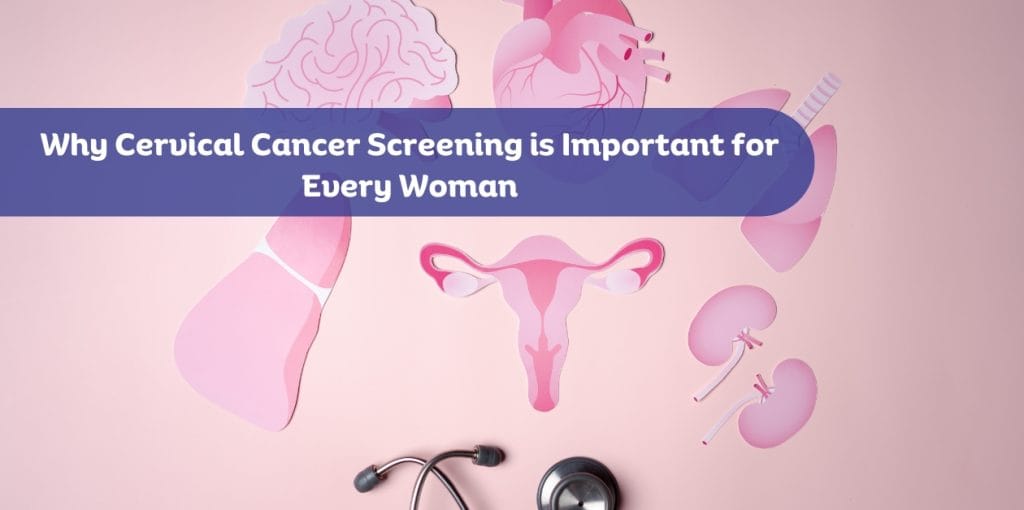Why Cervical Cancer Screening is Important for Every Woman

Cervical cancer is one of the most preventable forms of cancer, yet it continues to be a leading cause of cancer-related deaths among women worldwide. Early detection through regular cervical cancer screening, including the Pap smear test, is crucial for identifying abnormal changes in the cervix before they develop into cancer.
What is Cervical Cancer?
Cervical cancer occurs when abnormal cells in the cervix, the lower part of the uterus that connects to the vagina, begin to grow uncontrollably. Most cervical cancers are caused by persistent infection with certain strains of human papillomavirus (HPV), a common sexually transmitted infection. Most women who have HPV infections do not develop cervical cancer, but in some cases, the infection can cause changes in the cervix that may eventually lead to cancer if left untreated.
Regular cancer screening, such as the Pap smear, helps identify these changes early, giving women a chance to prevent cervical cancer before it even starts.
The Importance of Cervical Cancer Screening
- Early Detection Saves Lives
Cervical cancer typically develops slowly over many years, often without symptoms in its initial stages. Cervical cancer screening allows healthcare professionals to detect precancerous changes, known as dysplasia, or early-stage cancer before symptoms appear. By identifying these changes early, women have a greater chance of successful treatment and a much lower risk of developing advanced cervical cancer.
Early detection through Pap smear tests can catch abnormal cells at a stage when they can be treated easily, preventing the progression to invasive cancer.
- Preventative Measures with HPV Vaccination
Cervical cancer is primarily linked to HPV infections, with certain strains of the virus being high-risk factors for cancer development. HPV vaccination can significantly reduce the risk of cervical cancer. Routine screening, combined with HPV vaccination, provides a powerful preventative approach. While the vaccine does not treat existing infections, it can protect against the most dangerous strains of the virus that cause cervical cancer.
Regular screening remains essential even after vaccination, as it helps identify any changes in the cervix that may not be related to HPV infection.
- A Simple and Quick Test
The Pap smear is a simple, quick, and painless test that can be performed during a routine gynecological exam. During the procedure, a healthcare provider collects a sample of cells from the cervix and examines them for abnormalities. The test is highly effective in detecting precancerous changes and can be done every three years for women aged 21 to 65, depending on the individual’s health history and risk factors.
- Risk Reduction and Treatment Options
When cervical cancer is detected early, treatment options are far less invasive and more successful. For example, if abnormal cells are found, they can often be removed or treated before they turn cancerous. This is particularly true for women under 50, where treatment may involve a colposcopy (a detailed examination of the cervix), loop electrosurgical excision procedure (LEEP), or cryotherapy (freezing abnormal tissue).
By engaging in regular cancer screening, women can prevent or minimize the risk of cervical cancer, allowing them to retain their reproductive health and avoid more aggressive treatments like surgery or chemotherapy.
When Should You Start Cervical Cancer Screening?
The American College of Obstetricians and Gynecologists (ACOG) recommends that women begin cervical cancer screening at age 21, regardless of sexual activity. Women between the ages of 21 and 29 should have a Pap smear every three years. After age 30, women can undergo HPV testing along with the Pap smear every five years or continue with the Pap smear alone every three years.
Women over 65 who have had regular screenings and normal results may choose to stop cervical cancer screening. However, those who have a history of cervical cancer or certain precancerous conditions should continue screening.
Treatment for Cervical Cancer
If cervical cancer is diagnosed, treatment options depend on the stage of the disease. Early-stage cervical cancer may be treated with surgery, such as a hysterectomy (removal of the uterus), while more advanced cases may require a combination of surgery, radiation therapy, and chemotherapy.
Advances in targeted therapies and immunotherapies, as part of ongoing clinical trials, are offering new treatment options with fewer side effects and more effective outcomes.
Conclusion
Cervical cancer screening is one of the most important aspects of preventive care for women. With early detection, many cases of cervical cancer can be successfully treated, and in some cases, even prevented. By staying up to date with regular Pap smears, HPV testing, and cancer screenings, women can significantly reduce their risk and ensure their health is protected for years to come.
FAQs
About Author
Dr Saveetha Rathod
MBBS ,MD – PGI , MRCOG – UK,Diploma in cosmetic Gynaecology – ICCG
Dr. Saveetha Rathod is a well-known obstetrician and gynecologist in Hyderabad, known for her compassionate care and unwavering dedication to women’s health. She is deeply committed to continuous learning and growth, ensuring that each patient receives personalized and comprehensive support. Dr. Rathod’s collaborative approach and steadfast advocacy make her a trusted partner in every woman’s journey towards optimal well-being, regardless of age or background.

